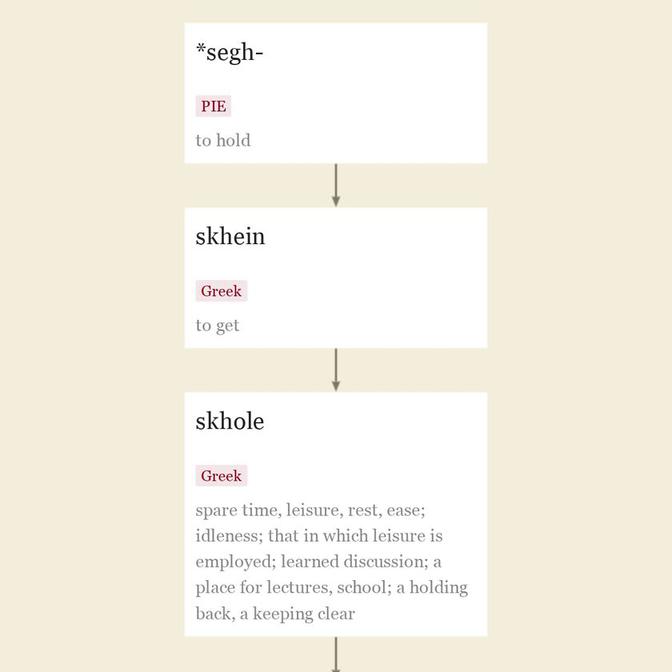diatribe (n.)
1640s (in Latin form in English from 1580s), "continued discourse, critical dissertation" (senses now archaic), from French diatribe (15c.) and directly from Latin diatriba "learned discussion," from Greek diatribe "employment, study," in Plato, "discourse," literally "a wearing away (of time), a waste of time," from dia "away" (see dia-) + tribein "to wear, rub," from PIE root *tere- (1) "to rub, turn." For sense evolution, compare school (n.1).
The modern meaning "a strain of invective, a bitter and violent criticism" by 1804, apparently from French.
Entries linking to diatribe
[place of instruction] Middle English scole, from Old English scol, "institution for instruction," from Latin schola "meeting place for teachers and students, place of instruction;" also "learned conversation, debate; lecture; disciples of a teacher, body of followers, sect," also in the older Greek sense of "intermission of work, leisure for learning."
This is from Greek skholē "spare time, leisure, rest, ease; idleness; that in which leisure is employed; learned discussion;" also "a place for lectures, school;" originally "a holding back, a keeping clear," from skhein "to get" (from PIE root *segh- "to hold") + -olē by analogy with bolē "a throw," stolē "outfit," etc.
The basic sense of the Greek word is "leisure," which passed to "otiose discussion" (in Athens or Rome, the favorite or proper use of free time), then it came to be used for the place for such discussion.
The Latin word was widely borrowed (in addition to Old French escole, French école, Spanish escuela, Italian scuola; Old High German scuola, German Schule, Swedish skola, Gaelic sgiol, Welsh ysgol, Russian shkola).
The meaning "students attending a school" in English is attested from c. 1300; the sense of "school building" is by 1590s. Sense of "people united by a general similarity of principles and methods" is from 1610s; hence school of thought (by 1848). As an adjective by mid-18c., "pertaining to or relating to a school or to education."
School of hard knocks "rough experience in life" is by 1870; to tell tales out of school "betray damaging secrets" is from 1540s. School-bus is from 1908. School days is from 1590s. School board "local committee of education" is by 1836; school district "division of a town or city for the management of schools" is by 1809.
*terə-, Proto-Indo-European root meaning "to rub, turn," with derivatives referring to twisting, also to boring, drilling, piercing; and to the rubbing of cereal grain to remove the husks, and thus to threshing.
It forms all or part of: atresia; attorn; attorney; attrition; contour; contrite; detour; detriment; diatribe; drill (v.) "bore a hole;" lithotripsy; return; septentrion; thrash; thread; thresh; throw; threshold; trauma; trepan; tribadism; tribology; tribulation; trite; triticale; triturate; trout; trypsin; tryptophan; turn.
It is the hypothetical source of/evidence for its existence is provided by: Sanskrit turah "wounded, hurt;" Greek teirein "to rub, rub away;" Latin terere "to rub, thresh, grind, wear away," tornus "turning lathe;" Old Church Slavonic tiro "to rub;" Lithuanian trinu, trinti "to rub," Old Irish tarathar "borer," Welsh taraw "to strike."
Trends of diatribe
More to Explore
updated on August 15, 2018

